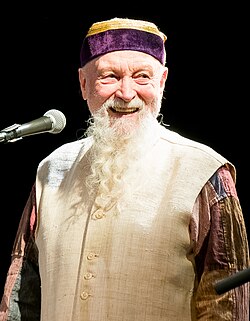This article needs additional citations for verification .(November 2025) |
Terry Riley | |
|---|---|
 Riley in 2017 | |
| Background information | |
| Born | June 24, 1935 |
| Genres | Minimalism, avant-garde, tape, electronic, microtonal, classical |
| Instruments | Electric organ, tape machine, saxophone, keyboards, synthesizer, piano, tambura |
| Years active | 1950s–present |
| Formerly of | Theatre of Eternal Music |
| Website | terryriley |
Terrence Mitchell Riley (born June 24, 1935) is an American composer and performing musician [1] best known as a pioneer of the minimalist school of composition. [2] Influenced by jazz and Indian classical music, his work became notable for its innovative use of repetition, tape delay systems, and improvisation. [2] His best known works are the 1964 composition In C and the 1969 album A Rainbow in Curved Air , both considered landmarks of minimalism and important influences on experimental music, rock, and contemporary electronic music. [2]
Contents
- Life
- Artistry
- Musical style
- Techniques
- Personal life
- Discography
- Filmography
- References
- Further reading
- External links
Raised in Redding, California, Riley began studying composition and performing solo piano in the 1950s. He befriended and collaborated with composer La Monte Young, and later became involved with both the San Francisco Tape Music Center and Young's New York collective, the Theatre of Eternal Music. A three-record deal with CBS in the late 1960s brought his work to wider audiences. In 1970, he began intensive studies under Hindustani singer Pandit Pran Nath, whom he often accompanied in performance. Subsequent works such as Shri Camel (1980) explored just intonation. [2] He has collaborated frequently throughout his career, most extensively with chamber ensemble the Kronos Quartet and his son, guitarist Gyan Riley. [2]

